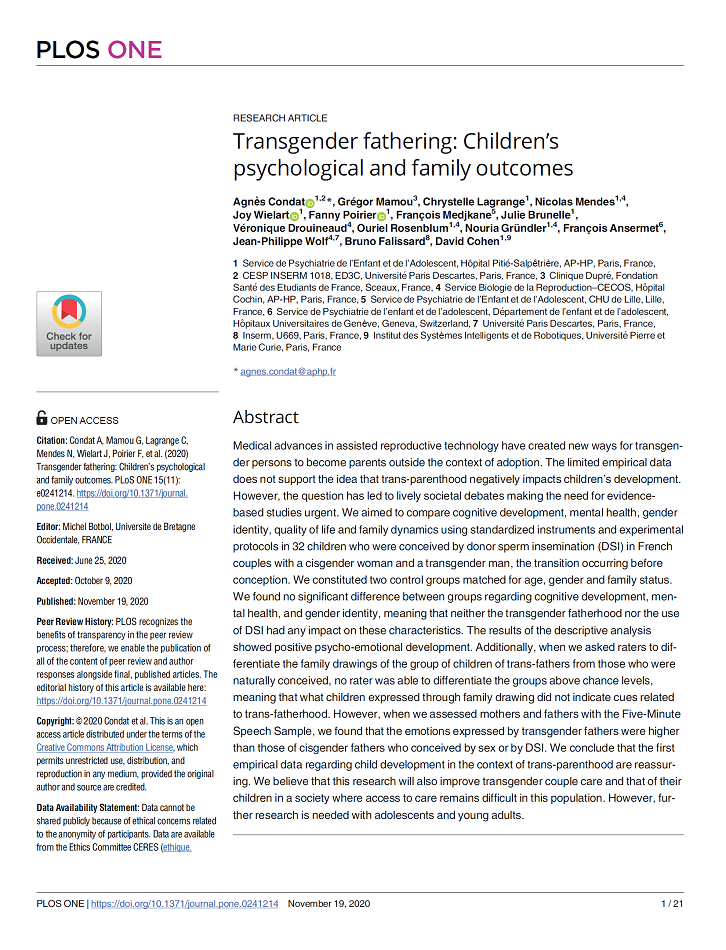Auteurs : Agnès Condat (1,2), Grégor Mamou (3), Chrystelle Lagrange (1), Nicolas Mendes (1,4), Joy Wielart (1), Fanny Poirier (1), François Medjkane (5), Julie Brunelle (1), Véronique Drouineaud (4), Ouriel Rosenblum (1,4), Nouria Gründler (1,4), François Ansermet (6), Jean-Philippe Wolf (4,7), Bruno Falissard (8), David Cohen (1,9)
1) Service de Psychiatrie de l’Enfant et de l’Adolescent, Hôpital Pitié-Salpêtrière, AP-HP, Paris, France,
2) CESP INSERM 1018, ED3C, Université Paris Descartes, Paris, France,
3) Clinique Dupré , Fondation Santé des Etudiants de France, Sceaux, France,
4) Service Biologie de la Reproduction–CECOS, Hôpital Cochin, AP-HP, Paris, France,
5) Service de Psychiatrie de l’Enfant et de l’Adolescent, CHU de Lille, Lille, France,
6) Service de Psychiatrie de l’enfant et de l’adolescent, Département de l’enfant et de l’adolescent, Hôpitaux Universitaires de Genève, Geneva, Switzerland,
7) Université Paris Descartes, Paris, France,
8) Inserm, U669, Paris, France, 9 Institut des Systèmes Intelligents et de Robotiques, Université Pierre et Marie Curie, Paris, France
Date de mise en ligne : 19 novembre 2020
Résumé
Medical advances in assisted reproductive technology have created new ways for transgender persons to become parents outside the context of adoption. The limited empirical data does not support the idea that trans-parenthood negatively impacts children’s development. However, the question has led to lively societal debates making the need for evidence-based studies urgent. We aimed to compare cognitive development, mental health, gender identity, quality of life and family dynamics using standardized instruments and experimental protocols in 32 children who were conceived by donor sperm insemination (DSI) in French couples with a cisgender woman and a transgender man, the transition occurring before conception. We constituted two control groups matched for age, gender and family status. We found no significant difference between groups regarding cognitive development, mental health, and gender identity, meaning that neither the transgender fatherhood nor the use of DSI had any impact on these characteristics. The results of the descriptive analysis showed positive psycho-emotional development. Additionally, when we asked raters to differentiate the family drawings of the group of children of trans-fathers from those who were naturally conceived, no rater was able to differentiate the groups above chance levels, meaning that what children expressed through family drawing did not indicate cues related to trans-fatherhood. However, when we assessed mothers and fathers with the Five-Minute Speech Sample, we found that the emotions expressed by transgender fathers were higher than those of cisgender fathers who conceived by sex or by DSI. We conclude that the first empirical data regarding child development in the context of trans-parenthood are reassuring. We believe that this research will also improve transgender couple care and that of their children in a society where access to care remains difficult in this population. However, further research is needed with adolescents and young adults.
Mots clés : Assistance médicale à la procréation, Pédopsychiatrie, Centre médico-psychologique, Parentalité, Développement psychologique
Citation : Condat A, Mamou G, Lagrange C, Mendes N, Wielart J, Poirier F, et al. (2020) Transgender fathering: Children’s psychological and family outcomes. PLoS ONE 15(11): e0241214. https://doi.org/10.1371/journal.pone.0241214
Lien du document : : https://doi.org/10.1371/journal.pone.0241214
Licence : : Copyright: © 2020 Condat et al. This is an open access article distributed under the terms of the Creative Commons Attribution License, which permits unrestricted use, distribution, and reproduction in any medium, provided the original author and source are credited.

